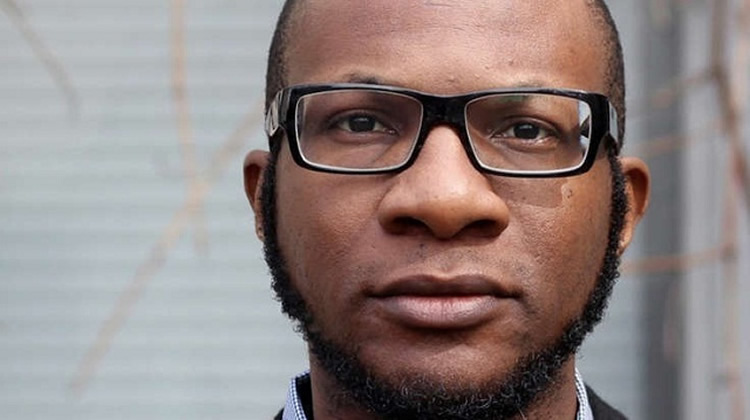Showcase
The Concise Art of Teju Cole

Nigerian-born writer Teju Cole is emerging as a pop star African thinker and someone young-er, African intellectuals are scrambling to talk to. In essence, he lends cool to African literacy which has long needed a dose of youthful relevance injected into it.
Brooklyn based Cole is famed, firstly for his acerbic prose and coining the phrase, 'the White Savior Industrial Complex', post the Kony scandal of March 2012 which gave him instant online and global notoriety.
His tweets were retweeted, forwarded, and widely shared. They migrated beyond Twitter to blogs, Tumblr and Facebook. They generated fierce arguments. They were reproduced in their entirety on the websites of the Atlantic and the New York Times, and they showed up on German, Spanish, and Portuguese sites. They got a mention on Fox television.
It would seem these sentences written without much premeditation, according to Cole, had touched a nerve.
Secondly, he's notorious for writing in brief. On his Twitter account, he crafts compact stories based on small news items, things you might overlook in the metro section of a newspaper. With brevity, his stories gain deeper meaning.
He called his earlier tweet-sized narratives "Small Fates" (which came to an end in January 2013).
'I had started doing research for a book that I'm writing, which is about Lagos, Nigeria - a narrative of contemporary life in the city,' he says. 'But as I was doing my research I found that there was certain material that I couldn't really put into the book. Odd stories, news of the weird - strange little things of the kind that would happen in any complicated modern society. And what was I going to do with this material? So I started writing short stories based on those narratives. I found that Twitter was a perfect place to post them."
Thirdly, Cole is a successful author of a novella, Every Day is for the Thief, and a novel, Open City, which won the PEN/Hemingway Award, the New York City Book Award for Fiction, the Rosenthal Award of the American Academy of Arts and Letters, and the Internationaler Literaturpreis, and was shortlisted for the National Book Critics Circle Award, the New York Public Library Young Lions Award, and the Ondaatje Prize of the Royal Society of Literature.
He's also a contributor to the New York Times, the New Yorker, Qarrtsiluni, the Atlantic, Granta, Aperture, Transition, A Public Space and the New Inquiry.
A pretty prolific guy all round, one we'd all love to have a conversation with.
Given we're all the way on the other side of the world, we've had to lean on journalist's Charl Blignaut's catch-up with Cole when he cornered him at the Open Book Fair in Cape Town in September this year.
This is what transpired:
Teju Cole has just appeared on a panel at Open Book. Responding to the old literary-fair chestnut "Is the novel dying?" he offered a sleek and gentle acceptance of new technologies influencing form.
The form of the novel has already changed because of e-readers and audio books, he told the packed room.
"I fully expect to see photos and videos appearing among the pages of the novel I'm reading any time now."
While others on the panel clung to the therapeutic act of reading, Cole proposed a different vision.
"People fear that multimedia is manic. But the novel as we know it was a manic form at first. Every form finds its own spaces and silences."
In thick-rimmed glasses, the slight, bearded young man wears a flowing purple African shirt and turquoise scarf. We settle in a corner to discuss his first-ever visit to South Africa. We have just 10 minutes because he has a date with some locals to visit Gugulethu to discover the joys of Mzoli's tavern and butchery.
Back
Brooklyn based Cole is famed, firstly for his acerbic prose and coining the phrase, 'the White Savior Industrial Complex', post the Kony scandal of March 2012 which gave him instant online and global notoriety.
His tweets were retweeted, forwarded, and widely shared. They migrated beyond Twitter to blogs, Tumblr and Facebook. They generated fierce arguments. They were reproduced in their entirety on the websites of the Atlantic and the New York Times, and they showed up on German, Spanish, and Portuguese sites. They got a mention on Fox television.
It would seem these sentences written without much premeditation, according to Cole, had touched a nerve.
Secondly, he's notorious for writing in brief. On his Twitter account, he crafts compact stories based on small news items, things you might overlook in the metro section of a newspaper. With brevity, his stories gain deeper meaning.
He called his earlier tweet-sized narratives "Small Fates" (which came to an end in January 2013).
'I had started doing research for a book that I'm writing, which is about Lagos, Nigeria - a narrative of contemporary life in the city,' he says. 'But as I was doing my research I found that there was certain material that I couldn't really put into the book. Odd stories, news of the weird - strange little things of the kind that would happen in any complicated modern society. And what was I going to do with this material? So I started writing short stories based on those narratives. I found that Twitter was a perfect place to post them."
Thirdly, Cole is a successful author of a novella, Every Day is for the Thief, and a novel, Open City, which won the PEN/Hemingway Award, the New York City Book Award for Fiction, the Rosenthal Award of the American Academy of Arts and Letters, and the Internationaler Literaturpreis, and was shortlisted for the National Book Critics Circle Award, the New York Public Library Young Lions Award, and the Ondaatje Prize of the Royal Society of Literature.
He's also a contributor to the New York Times, the New Yorker, Qarrtsiluni, the Atlantic, Granta, Aperture, Transition, A Public Space and the New Inquiry.
A pretty prolific guy all round, one we'd all love to have a conversation with.
Given we're all the way on the other side of the world, we've had to lean on journalist's Charl Blignaut's catch-up with Cole when he cornered him at the Open Book Fair in Cape Town in September this year.
This is what transpired:
Teju Cole has just appeared on a panel at Open Book. Responding to the old literary-fair chestnut "Is the novel dying?" he offered a sleek and gentle acceptance of new technologies influencing form.
The form of the novel has already changed because of e-readers and audio books, he told the packed room.
"I fully expect to see photos and videos appearing among the pages of the novel I'm reading any time now."
While others on the panel clung to the therapeutic act of reading, Cole proposed a different vision.
"People fear that multimedia is manic. But the novel as we know it was a manic form at first. Every form finds its own spaces and silences."
In thick-rimmed glasses, the slight, bearded young man wears a flowing purple African shirt and turquoise scarf. We settle in a corner to discuss his first-ever visit to South Africa. We have just 10 minutes because he has a date with some locals to visit Gugulethu to discover the joys of Mzoli's tavern and butchery.
Back









 You want to showcase?
You want to showcase?